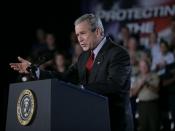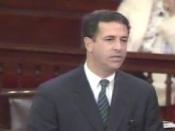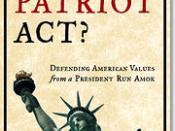The September 11th attacks on the World Trade Center in New York City had devastated millions of people throughout the world, especially those closely related to the victims. The US government did not think twice and passed a bill on October 26, 2001 that would expand the government's power to apprehend possible terrorists. This bill is called the Patriot Act. The price of the Patriot Act was the average American's right to privacy.
The Patriot Act gives the government more legal power to do checks on people via phone taps, pen registers, trap and traces, and through the Internet Service Providers we use. Why I find this so outrageous is that Title III of the Omnibus Crime Control and the Safe Street Act of 1968 prohibited electronic eavesdropping on any conversations through phones, email, or any electronic forms of messaging. The only way to legally do it was to get legal permission from the Justice Department and to show that by snooping around you could find something related to the case at hand.
Getting approval for stored information is much easier. One only needs a court order that justifies that the search is needed for the criminal investigation.
The courts also have the power to allow pen registers and trap and trace devices. These give not much more information than the people a person talked to and the time and day the conversations were held. The details of the conversation are not disclosed. Even though it is the least intrusive, one will still need to prove that the information extracted through these methods will benefit the case in some way.
How has the Patriot Act affected my protection of privacy? Well, it adds terrorism to the list of crimes in Level 1, voicemails are treated as emails in...


